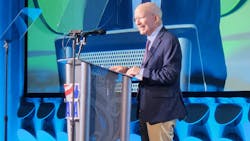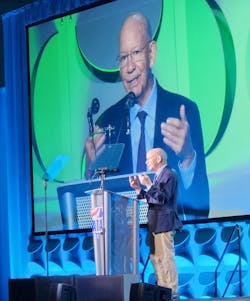Rep. DeFazio: Political 'potholes' hamper highway funding
SAN DIEGO—A luncheon address at the American Trucking Associations’ Management Conference & Exhibition took a somewhat surprising turn to the political left as Rep. Peter DeFazio, of self-described ”progressive” Democrat from Oregon, touched on his efforts to claw back some of the billions in “windfall profits” being booked by oil companies, then drew murmurs from the audience when he mentioned his legislation to improve aircraft certification “so that we'll never have a corporation killing people for profit againlike—like Boeing did.”
Following DeFazio’s remarks, the dining room soundtrack kicked off with a tune from the Grateful Dead.
But, otherwise, the retiring chairman of the House Committee on Transportation & Infrastructure accepted his ATA Highway Diamond Award and spent most of his 20 minutes on stage recalling a long career in Congress and the many bipartisan projects he and ATA have worked together on.
“Without all of you and all your employees, the country would grind to a halt—we all know that,” DeFazio said. “And I've been with you every step of the way to move America forward for 36 years working on the committee. We didn’t agree every time, but we worked a lot of stuff out over those years.”
See also:ATA’s Spear: 'Don't mess with trucking'I’ve covered hours and hours of transportation committee hearings, and have found DeFazio to be thoughtful and open, typically of good humor and patient. And without that patience, he wouldn’t have made it this long—especially over the last couple of decades, as highway bills have been stuck in limbo without sufficient funding and without the earmarks that had previously been divvied up to get members on board.
“The days when the Highway Trust Fund was adequate to meet the nation's needs are a very distant memory,” he said. “The last time we raised the gas and diesel tax was in 1993. And since then, it's been a lot of potholes, a lot of detours.”
He recalled “a very ambitious” $300 billion highway bill he wrote in 2009, only to have President Obama decline to support an increase in the gas tax that would have funded the plan. He likewise mentioned a White House meeting where President Trump surprised the room by nearly doubling what lawmakers were proposing in their infrastructure plan, upping the ante to $2 trillion—a bold proclamation that prompted a “Twitter fit” from his chief of staff, who was across the country at the time of the meeting.
“We never got to the discussion about actually funding it, even though we had agreed on all the aspects that needed work,” DeFazio said.
Still, “we're finally getting some relief,” he added, pointing to the $1.2 trillion Infrastructure Investment and Jobs Act, passed last year: the “largest expenditure ever” dedicated to U.S. infrastructure. He lauded IIJA’s billions of dollars dedicated to roads and bridges, as well as the early investment in a national vehicle charging network.
“We did it with tremendous support from this organization at the grassroots, all around the country,” DeFazio said, noting specifically ATA’s help in lobbying the Senate. “We didn't get all the policies that I wanted, but we got we got quite a few that are very important.”
Of course, that plan earned bipartisan support as lawmakers looked to spur the economic recovery from the pandemic downturn. DeFazio praised the trucking industry for keeping the supply chain moving since the 2020 shutdown.
“It was an incredible challenge, and you met that challenge and kept the country going,” he said. “Every aspect of American life counts on your companies and drivers continuing to serve in tough conditions.”
And DeFazio knows those conditions well, pointing to “bottlenecks, congestion, load-posted bridges, extraordinary fuel prices, delays at shipper and receiver facilities, and driver turnover.”
See also: DOT leader touts safety, making trucking a better place to work for drivers
Indeed, noting the transportation committee’s efforts to make the job of a truck driver “more attractive and predictable,” DeFazio recalled that he introduced legislation targeting detention time 15 years ago. “But I’ve never been able to move it,” he said.
He suggested that Uber Freight’s technology for rating shippers and receivers “could be a partial fix” from the private sector, as low ratings will mean “they're going to have to shape up” or drivers won’t be taking their unattractive loads.
Noting that he’s “not a fan of tolling,” DeFazio credited trucking for winning “a great victory” in blocking a “discriminatory” truck tolling plan in Rhode Island. He cautioned, however, that many Republicans in Congress consider highway funding to be a state issue rather than a federal responsibility and that states can generate funds “by tolling everything.”
“I don't believe in that; I know you don't believe in that,” he said. “We’re going to have to be on guard.”
While DeFazio drew applause for saying the Federal Excise Tax on trucks and trailers should be “done away with altogether,” he added the revenue will have to be replaced. He suggested the next surface transportation bill should get rid of “all this miscellaneous BS” and find a stable, long-term source of funding—and that likely will mean moving to a vehicle-miles-traveled tax.
“That's going to be a big challenge,” he said.
About the Author
Kevin Jones
Editor
Kevin has served as editor-in-chief of Trailer/Body Builders magazine since 2017—just the third editor in the magazine’s 60 years. He is also editorial director for Endeavor Business Media’s Commercial Vehicle group, which includes FleetOwner, Bulk Transporter, Refrigerated Transporter, American Trucker, and Fleet Maintenance magazines and websites.
Working from Beaufort, S.C., Kevin has covered trucking and manufacturing for nearly 20 years. His writing and commentary about the trucking industry and, previously, business and government, has been recognized with numerous state, regional, and national journalism awards.


